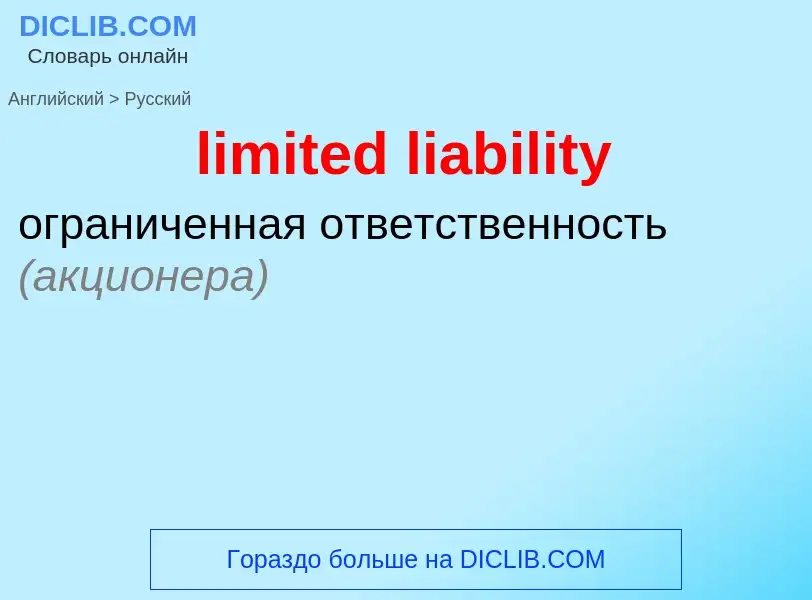Μετάφραση και ανάλυση λέξεων από την τεχνητή νοημοσύνη ChatGPT
Σε αυτήν τη σελίδα μπορείτε να λάβετε μια λεπτομερή ανάλυση μιας λέξης ή μιας φράσης, η οποία δημιουργήθηκε χρησιμοποιώντας το ChatGPT, την καλύτερη τεχνολογία τεχνητής νοημοσύνης μέχρι σήμερα:
- πώς χρησιμοποιείται η λέξη
- συχνότητα χρήσης
- χρησιμοποιείται πιο συχνά στον προφορικό ή γραπτό λόγο
- επιλογές μετάφρασης λέξεων
- παραδείγματα χρήσης (πολλές φράσεις με μετάφραση)
- ετυμολογία
limited liability - translation to ρωσικά
общая лексика
LLC компания с ограниченной ответственностью
(компания, общество или товарищество с ограниченной ответственностью по обязательствам (в пределах акционерного или паевого капитала); отвечает только по своим обязательствам и только принадлежащим ей имуществом и не несет ответственности по обязательствам акционеров, равно как и акционеры не несут ответственности по обязательствам компании; объединяет преимущества налогообложения товарищества и ограниченную ответственность корпорации, хотя последней не является)
синоним
Смотрите также
Ορισμός
Βικιπαίδεια
Limited liability is a legal status in which a person's financial liability is limited to a fixed sum, most commonly the value of a person's investment in a corporation, company or partnership. If a company that provides limited liability to its investors is sued, then the claimants are generally entitled to collect only against the assets of the company, not the assets of its shareholders or other investors. A shareholder in a corporation or limited liability company is not personally liable for any of the debts of the company, other than for the amount already invested in the company and for any unpaid amount on the shares in the company, if any, except under special and rare circumstances permitting "piercing the corporate veil." The same is true for the members of a limited liability partnership and the limited partners in a limited partnership. By contrast, sole proprietors and partners in general partnerships are each liable for all the debts of the business (unlimited liability).
Although a shareholder's liability for the company's actions is limited, the shareholders may still be liable for their own acts. For example, the directors of small companies (who are frequently also shareholders) are often required to give personal guarantees of the company's debts to those lending to the company. They will then be liable for those debts that the company cannot pay, although the other shareholders will not be so liable. This is known as co-signing. A shareholder who is also an employee of the corporation may be personally liable for actions the employee takes in that capacity on behalf of the corporation, in particular torts committed within the scope of employment.
Limited liability for shareholders for contracts entered by the corporation is not controversial because this could and probably would be agreed to by both parties to the contract. However, limited liability for shareholders for torts (or harms not agreed to in advance) is controversial because of concerns that such limited liability could lead to excessive risk taking by companies and more negative externalities (i.e., more harm to third parties) than would be produced in the absence of limited liability. According to one estimate, negative corporate externalities on an annual basis are equal to between 5 and 20 percent of U.S. GDP.
An issue in liability exposure is whether the assets of a parent entity and the sole owner need to be subject to the subsidiary’s liabilities, when the subsidiary is declared insolvent and owes debt to its creditors. As a general principle of corporate law, in the United States, a parent entity and the sole owner are not liable for the acts of its subsidiaries. However, as a caveat, they may be liable for its subsidiaries’ obligations when the law supports "piercing the corporate veil".
Provided that the parent entity or the sole owner do not maintain separate legal identities from the subsidiary (through inadequate/ undocumented transfer of funds and assets), the judgment is likely to be in favor of the creditor. In the same regard, if a subsidiary is undercapitalized from its inception, that may be grounds for piercing the corporate veil. Further, if injustice/fraud to the creditor is proven, the parent entity or the owner may be held liable to compensate the creditor. Thus, there is not one characteristic that defines the piercing of a corporate veil - a factors test is used to determine if piercing is appropriate or not.
If shares are issued "part-paid", then the shareholders are liable, when a claim is made against the capital of the company, to pay to the company the balance of the face or par value of the shares.

